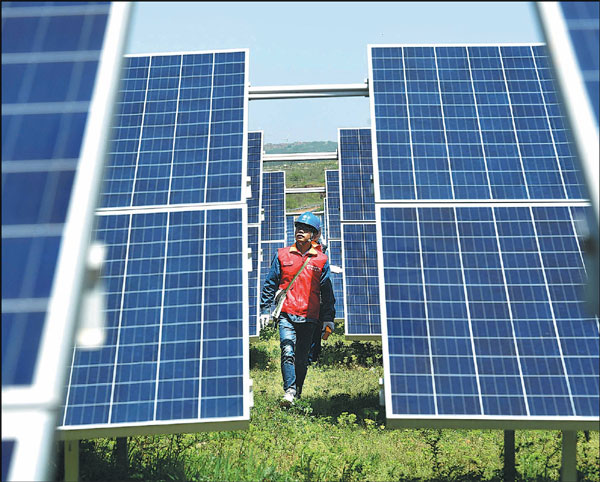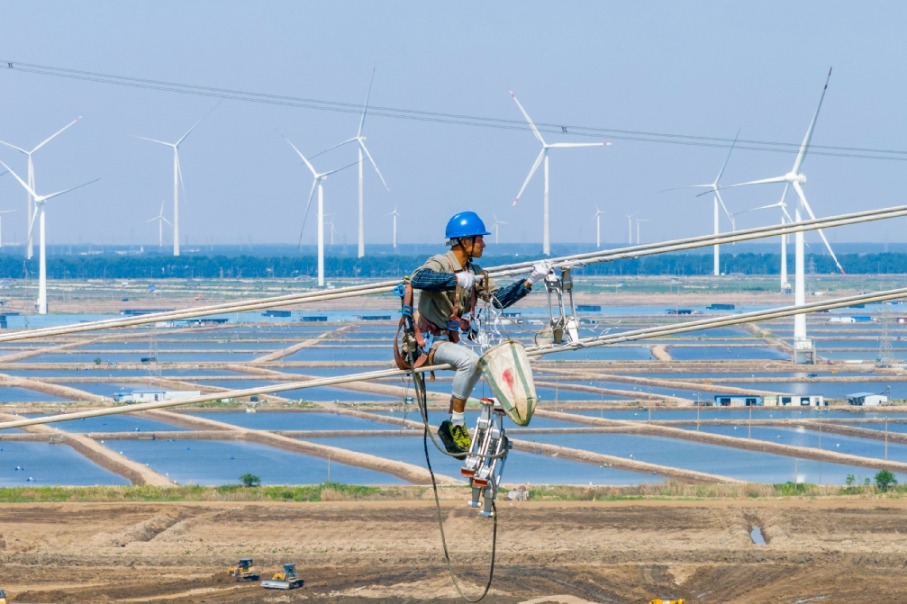The coming clean energy revolution

Market's 'huge' potential includes big strides in wind, solar and nuclear power projects in China
China is expected to invest about $3 trillion (2.5 trillion euros; £2.3 trillion) in power generation over the next 25 years, according to a recent report released by Bloomberg New Energy Finance.
About 75 percent of the expected investment will flow into the renewable energy sector.
Investment in the wind power sector will reach $1 trillion, the report said. The solar and nuclear power sectors will attract $700 billion each.
| A solar power farm in the remote mountains of Dingyuan county, Anhui province, is part of an effort that has helped alleviate poverty in the region. Song Weixing / For China Daily |
Bloomberg New Energy Finance estimated that between 2030 and 2040, building wind and solar plants will be cheaper than building coal plants or even operating existing coal plants.
As a result, China will retire coal plants - whose collective power generation capacity would be 360 gigawatts, 145 gW of which will be forced out of the system - because operating wind and solar plants will be less expensive.
"There have been three consecutive years that the global carbon emission remained stable. The biggest reason behind that is what China had done in the past years. China has become the world's largest country producing and consuming renewable energy, and its carbon emission dropped in both 2015 and 2016," says Spencer Dale, BP Group chief economist.
The report from Bloomberg New Energy Finance also said that by 2026, more than half of China's installed capacity will come from zero carbon emissions energy, including nuclear, biomass, large hydro, wind and solar energy, and the figure will rise to 63 percent by 2040, doubling China's current level.
In 2015, the National Energy Administration issued a "Front Runner" project to encourage the research and development of photovoltaic products, which have the highest energy efficiency, by building demonstration bases as well as launching innovative projects in the field.
JA Solar Holdings, one of the world's largest producers of solar energy products, offered the largest volume of modules to the "Front Runner" project. In the first phase of the project, it supplied 422 megawatts of modules, accounting for about 50 percent of the total volume in that phase.
"The Chinese government is supportive of developing clean energy, and the market potential in the field is huge. Therefore, we grasp the opportunity to continue our research and development in high-performance solar power products," says Xie Jian, president of JA Solar.
"In the first quarter of this year, we started mass production of Bifacial PERC (passivated emitter rear cell) modules with double-glass structure. The module can produce 16 percent more power than the conventional PERC modules. It provides new solutions to achieve (photovoltaic) grid parity where PV power costs are similar to those for fossil fuels."
Xie says that in the first half of this year, JA Solar signed a strategic agreement with Peking University to establish the first "Summer School" in the photovoltaic field. Through their collaboration, JA Solar aims to cultivate photovoltaic talent with creative ideas and innovative abilities.
Han Xiaoping, chief information officer at Beijing-based China Energy Net Consulting Co, says: "China's installed photovoltaic power capacity ranks first in the world. Photovoltaic power, especially distributed photovoltaic power, enjoys favorable government policies."
Han says families from rural regions in China have installed distributed photovoltaic power systems on their roofs and have made money from the power generated. Each of the farmers can earn from 3,000 yuan ($455; 383 euros; £352) to 5,000 yuan annually. So photovoltaic power not only saves the planet but alleviates poverty, Han says.
Xie says: "We have 11 production facilities around the globe. The new production facility launched this June in Baotou, Inner Mongolia autonomous region, will further increase the capacity of silicon wafers. It is estimated that by the end of this year, our PERC technology will raise the solar cell efficiency from 20.5 percent to 21.2 percent."
Bloomberg contributed to this story.
zhengyiran@chinadaily.com.cn
(China Daily European Weekly 09/01/2017 page27)
Today's Top News
- Xi urges villagers in Xizang to uphold ethnic solidarity
- Digital tax sparks breakdown in US-Canada trade talks
- Expert debunks Lai's 'four elements' argument for Taiwan's so-called statehood
- China opposes any tariff deal made at its expense: commerce ministry
- Nepal's hydropower a climate change solution
- UN Charter still guiding compass of humankind































